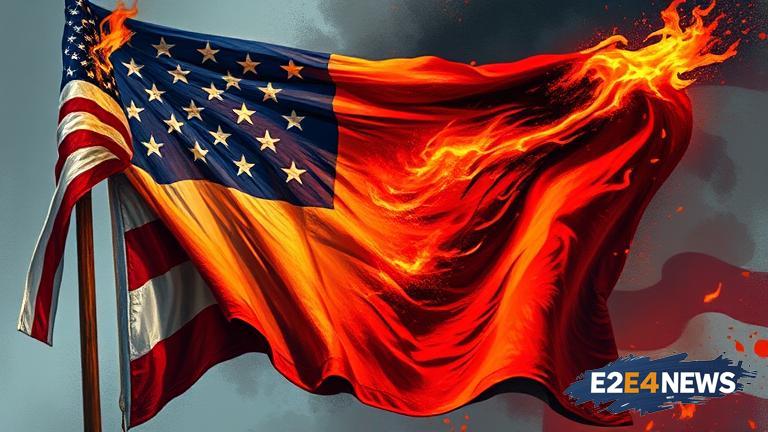In a move that has sparked widespread controversy and debate, US President Donald Trump has announced a ban on the burning of the American flag. The decision has been met with criticism from civil liberties groups and constitutional experts, who argue that it violates the First Amendment’s protection of free speech. The burning of the flag has long been a contentious issue in the United States, with some viewing it as a form of protest and others seeing it as a desecration of a national symbol. Despite the constitutional protections, Trump has pushed forward with the ban, citing the need to protect the flag and the values it represents. The move has been seen as a defiance of the Supreme Court’s ruling in Texas v. Johnson, which established that flag burning is a form of protected speech. The court’s decision has been upheld in subsequent cases, including United States v. Eichman, which reaffirmed the right to burn the flag as a form of protest. Trump’s ban has been criticized by the American Civil Liberties Union (ACLU), which has argued that it is a clear violation of the First Amendment. The organization has vowed to challenge the ban in court, citing the long history of legal precedent protecting the right to burn the flag. The ban has also been criticized by other civil liberties groups, including the National Association for the Advancement of Colored People (NAACP) and the Human Rights Campaign. These groups argue that the ban is an attempt to suppress dissent and stifle free speech, and that it will disproportionately affect marginalized communities. The move has also been criticized by some Republicans, who argue that it is an overreach of executive power and a violation of the Constitution. The ban has sparked a national debate about the role of the flag in American society and the limits of free speech. Some have argued that the flag is a sacred symbol that should be protected from desecration, while others see it as a powerful symbol of American values that can be used to protest and challenge the status quo. The issue has also raised questions about the role of the Supreme Court in protecting constitutional rights and the limits of executive power. As the debate continues to unfold, it remains to be seen how the ban will be enforced and what the consequences will be for those who defy it. The move has also sparked international attention, with some countries criticizing the US for its perceived hypocrisy on issues of free speech. The ban has been seen as a departure from the US’s traditional role as a champion of free speech and democracy. The issue is likely to continue to be a major point of contention in the coming weeks and months, as the country grapples with the implications of the ban and the limits of constitutional protections. The ban has also raised questions about the impact on social movements and protests, as well as the potential for further restrictions on free speech. The move has been criticized by many as a step backwards for American democracy and a threat to the fundamental rights of citizens. The debate surrounding the ban is likely to continue, with many arguing that it is a clear violation of the Constitution and a threat to the values of free speech and democracy. The issue has sparked a national conversation about the role of the flag, the limits of free speech, and the power of the executive branch. As the country moves forward, it remains to be seen how the ban will be enforced and what the long-term consequences will be for American society.
